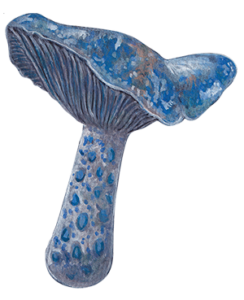 Research has shown that edible mushrooms from a range of genera exert various anticancer treatment effects.1 In addition, further investigation of α-amanitin, a toxin found in the poisonous Amanita phalloides mushroom, as a possible anticancer treatment has progressed with the development of antibody–drug conjugates, allowing for its safe delivery into the body,2 and mouse studies have suggested its efficacy in treating colorectal cancer3 and pancreatic cancer,4 among others. In vitro, the administration of α-amanitin was also shown to inhibit subpopulations of cancer cells that survive in the presence of drugs (i.e., “drug-tolerant colonies”), suggesting its potential to prevent post-treatment cancer relapse.5 Separately, illudins, which are terpene compounds derived from the poisonous mushroom Omphalotus illudens and related basidiomycetes, are rapidly (<2 hours) cytotoxic to different hematopoietic leukemia and solid tumor cells at pico- to nanomolar concentrations, while normal bone marrow progenitors and fibroblasts require longer exposure times at micro- or millimolar concentrations to experience similar effects,6 which may support their development as cancer therapeutics. Importantly, mushrooms should not be used to replace prescribed medications or therapies without prior discussion with a physician.
Research has shown that edible mushrooms from a range of genera exert various anticancer treatment effects.1 In addition, further investigation of α-amanitin, a toxin found in the poisonous Amanita phalloides mushroom, as a possible anticancer treatment has progressed with the development of antibody–drug conjugates, allowing for its safe delivery into the body,2 and mouse studies have suggested its efficacy in treating colorectal cancer3 and pancreatic cancer,4 among others. In vitro, the administration of α-amanitin was also shown to inhibit subpopulations of cancer cells that survive in the presence of drugs (i.e., “drug-tolerant colonies”), suggesting its potential to prevent post-treatment cancer relapse.5 Separately, illudins, which are terpene compounds derived from the poisonous mushroom Omphalotus illudens and related basidiomycetes, are rapidly (<2 hours) cytotoxic to different hematopoietic leukemia and solid tumor cells at pico- to nanomolar concentrations, while normal bone marrow progenitors and fibroblasts require longer exposure times at micro- or millimolar concentrations to experience similar effects,6 which may support their development as cancer therapeutics. Importantly, mushrooms should not be used to replace prescribed medications or therapies without prior discussion with a physician.
Sources
1. Patel S, Goyal A. Recent developments in mushrooms as anti-cancer therapeutics: a review. Biotech. 2012;2(1):1–15.
2. Heidelberg Pharma. A targeted cancer chemotherapy with a new mode of action. Available at: https://www.nature.com/articles/d43747-020-01103-2. Accessed April 30, 2023.
3. Liu Y, Zhang X, Han C, et al. TP53 loss creates therapeutic vulnerability in colorectal cancer. Nature. 2015;520(7549):697–701.
4. Moldenhauer G, Salnikov AV, Luttgau S, Herr I, Anderl J, Faulstich H. Therapeutic potential of amanitin-conjugated anti-epithelial cell adhesion molecule monoclonal antibody against pancreatic carcinoma. J Natl Cancer Inst. 2012;104(8):622–634.
5. Kume K, Ikeda M, Miura S, et al. α-amanitin restrains cancer relapse from drug-tolerant cell subpopulations via TAF15. Sci Rep. 2016;6:25895.
6. Kelner MJ, McMorris TC, Montoya MA, et al. Characterization of cellular accumulation and toxicity of illudin S in sensitive and nonsensitive tumor cells. Cancer Chemother Pharmacol. 1997;40:65–71.





